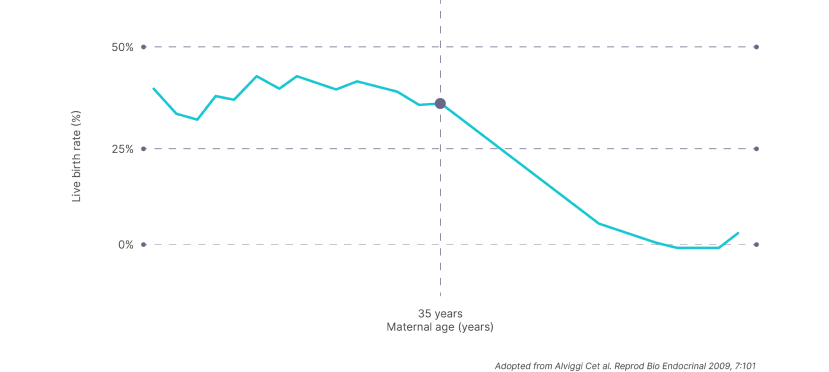Getting Pregnant 101

How Can I Improve My
Chances of Getting Pregnant?
Getting pregnant doesn’t always happen straight away. It is an amazing experience, but what most couples don’t realise is that it’s more complicated than it seems. Over the past three decades, fertility science has helped millions of couples overcome their difficulties and have a family of their own1. Depending on what is causing your fertility problems, there are a range of tips and treatments available to help you to have children.
You may need more time, and if it doesn’t happen after a given number of months, the couple may need medical assistance or more advanced treatment. But with the right support, many couples may be able to achieve their dream of having a child.
Fertility can be a challenging subject and acknowledging that you may need some assistance can be painful. However, seeking help to conceive is a brave and positive step forward. As age has a strong impact on fertility (with a woman’s fertility decreasing as she gets older)2, the sooner you seek help the closer you can be to having a baby of your own.

How Many People
Are Having Problems Getting Pregnant?
There is always great comfort in knowing that you are not alone. In 2020, the total fertility rate (TFR) was at 1.7 in Malaysia6 and 1.1 in Singapore7. Following the trends of the past decades, it is expected to fall even further. This TFR score refers to the number of successful babies being born per woman in her reproductive years, and compared to about 4 decades ago this number has dropped significantly in both countries, signalling potential fertility issues.
So, if you’ve been looking for answers and support in your journey to become pregnant, here’s where you can get help! In fact, why not check your fertility status now, by taking our questionnaire?
We have the information and resources about treatment options you need to find the nearest fertility expert. Seek the advice of an expert now so that you know your next step in starting your family!
Am I Fertile
Enough?
Infertility is medically defined as the inability to conceive after 12 months of unprotected sex8.
However, if your partner is 35 years old or over, you or your partner may be considered infertile if you haven’t conceived after 6 months of unprotected sex. Infertility may take place due to medical reasons like ovulation disorders, pre-existing conditions or even other reasons like stress, age, or a combination of factors.
Sometimes, a couple who has already had a child can have trouble conceiving again. This is called secondary infertility.
Conceiving isn’t easy — even for women at their most fertile age. While men stay fertile for a longer period than women, the quality and number of their sperm substantially decline with age9 10.

Live Birth Rate Declines After Age 35

Am I Too Old to
Get Pregnant?
30, becoming more rapid during the mid-30s and by 45, getting pregnant naturally is unusual for most women.
Natural Changes
getting pregnant more difficult. These include:

Number of eggs declining
Women are born with around
1–2 million eggs. This number
continually declines from
birth11. At 37 years old, there
are around 25,000 eggs left12

Quality of eggs declining
as a woman ages, there’s a
greater chance that her eggs
will have an abnormal number
of chromosomes which can
affect the health of embryos13

Gradual exposure to diseases
As time passes, the
reproductive system is more
exposed to diseases that can
affect fertility, such as
endometriosis15

Irregular ovulation
A woman’s menstrual cycle
can become shorter and
irregular with age14

Sex drive declining
This may mean that you have
sex less frequently as you get
older16


This is because as women get older, the number of eggs decreases, which in turn, lowers the chances of pregnancy. Around 1 in 4 women will get pregnant in any single menstrual cycle for healthy couples in their 20s and early 20s. Unfortunately, by age 40, the number drops to 1 in 10 women getting pregnant per menstrual cycle. As for men, fertility declines in increasingly noticeable amounts after the age of 55. In other words, if you aren’t quite sure if you’ve got a problem, please consult a fertility specialist sooner than later! The earlier you go the more options you will have.
Signs & Symptoms of Infertility
Infertility isn’t necessarily a permanent condition and it doesn’t mean that having a
child is impossible. You may just need a little help from a fertility specialist to get there.
Why Infertility Happens21


Symptoms of Female Infertility
- Often asymptomatic
- Heavy or painful periods
- Irregular or absent periods

Symptoms of Male Infertility
- Often without symptoms
- Erectile or ejaculation issues
- Testicular pain

Signs of Female Infertility
01
Pain during sex
02
Heavy, long or painful periods
03
Irregular menstrual cycle

Signs of Male Infertility
01
Hormonal imbalances
Testosterone is critical in sperm production and is a key hormone for male fertility. Reduced testosterone leads to reduced sperm, affecting the chances of fertilisation of the oocytes leading to infertility.Erectile dysfunction – It might happen due to a mix of hormonal changes, physical or psychological factors.
02
Problems with ejaculation
Having difficulty ejaculating or a drop in volume of ejaculate is a sign of an underlying issue affecting male fertility.
03
Other issues
Swollen, painful or tender testicles may be caused by an infection, which can impact sperm quality, therefore a cause for infertility.
Causes of Female Infertility
A few causes of infertility may include:
Causes of Male Infertility
Causes for infertility for males include:
Does Age Affect
Male Fertility?
Unlike women, whose fertility significantly declines after the age of 35, men’s fertility doesn’t decline until they are much older. Although sperm quality deteriorates as men age, this does not create a problem until after the age of 6032.
Learn more about how age can impact your fertility, and why it’s best to seek advice to conceive as early as possible. If you’re here looking for answers and support for fertility issues, then jump straight into our Getting Help section, where you’ll find information and resources about treatment options available.

Understanding Fertility
Get The
Right Help

Take our questionnaire to check on your fertility status.


References:
- European Society of Human Reproduction and Embryology (ESHRE). ART fact sheet. Press information. Available at: new.eshre.eu/~/media/sitecore-files/Annual-meeting/Lisbon/ART-fact-sheet.pdf?la=en. Accessed: February 2018.
- American Society for Reproductive Medicine (ASRM). Age and fertility. A guide for patients. 2012. Available at:
http://www.reproductivefacts.org/globalassets/rf/news-and-publications/bookletsfact-sheets/english-fact-sheets-and-info-booklets/Age_and_Fertility.pdf. Accessed: February 2018. - Chandra, A., Copen, C.E., & Stephen, E.H. (2013). Infertility and Impaired Fecundity in the United States, 1982-2010: Data From the National Survey of Family Growth. National Health Statistics Reports, 67, 1-19. Retrieved February 7, 2018, from https://www.cdc.gov/nchs/data/nhsr/nhsr067.pdf
- American Society for Reproductive Medicine (ASRM). Prevalence of infertility in the United States as estimated by the current duration approach and a traditional constructed approach. 2013. Available at:
https://www.fertstert.org/action/showPdf?pii=S0015-0282%2812%2902449-1 - American Society for Reproductive Medicine (ASRM). Age and fertility. A guide for patients. 2012. Available at:
http://www.reproductivefacts.org/globalassets/rf/news-and-publications/bookletsfact-sheets/english-fact-sheets-and-info-booklets/Age_and_Fertility.pdf. Accessed: February 2018. - Department of Statistics Malaysia. (n.d.). Department of Statistics Malaysia.
https://www.dosm.gov.my/v1/index.php?r=column/cthemeByCat&cat=165&bul_id=UDlnQ05GMittVXJWZUVDYUFDcjVTZz09&menu_id=L0pheU43NWJwRWVSZklWdzQ4TlhUUT09 - ‘Population Trends’ publication, the Infographics on ‘Total Fertility Rate’ https://www.singstat.gov.sg/-/media/files/publications/population/population2021.pdf
- Infertility FAQs. (n.d.). Centers for Disease Control and Prevention.
https://www.cdc.gov/reproductivehealth/infertility/index.htm#:~:text=In%20general%2C%20infertility%20is%20defined,6%20months%20of%20unprotected%20sex. - Dunson D, et al. Hum Reprod 2002;17(5):1399–1403.
- Harris I, et al. Rev Urol 2011;13(4):e184–e190
- The American College of Obstetricians and Gynecologists Committee on Gynecologic Practice and The Practice Committee of the American Society for Reproductive Medicine. Fertil Steril 2014;101(3):633–634.
- The American College of Obstetricians and Gynecologists Committee on Gynecologic Practice and The Practice Committee of the American Society for Reproductive Medicine. Fertil Steril 2014;101(3):633–634.
- American Society for Reproductive Medicine (ASRM). Age and fertility. A guide for patients. 2012. Available at
http://www.reproductivefacts.org/globalassets/rf/news-and-publications/bookletsfact-sheets/english-fact-sheets-and-info-booklets/Age_and_Fertility.pdf. Accessed: February 2018. - American Society for Reproductive Medicine (ASRM). Age and fertility. A guide for patients. 2012. Available at
http://www.reproductivefacts.org/globalassets/rf/news-and-publications/bookletsfact-sheets/english-fact-sheets-and-info-booklets/Age_and_Fertility.pdf. Accessed: February 2018. - The American College of Obstetricians and Gynecologists Committee on Gynecologic Practice and The Practice Committee of the American Society for Reproductive Medicine. Fertil Steril 2014;101(3):633–634.
- The American College of Obstetricians and Gynecologists Committee on Gynecologic Practice and The Practice Committee of the American Society for Reproductive Medicine. Fertil Steril 2014;101(3):633–634.
- George K and Kamath M. J Hum Reprod Sci 2010;3:121–123.
- American Society for Reproductive Medicine (ASRM). Age and fertility. A guide for patients. 2012. Available at
http://www.reproductivefacts.org/globalassets/rf/news-and-publications/bookletsfact-sheets/english-fact-sheets-and-info-booklets/Age_and_Fertility.pdf. Accessed: February 2018. - George K and Kamath M. J Hum Reprod Sci 2010;3:121–123.
- American Society for Reproductive Medicine (ASRM). Age and fertility. A guide for patients. 2012. Available at
http://www.reproductivefacts.org/globalassets/rf/news-and-publications/bookletsfact-sheets/english-fact-sheets-and-info-booklets/Age_and_Fertility.pdf. Accessed: February 2018. - US Department of Health & Human Services. Female Infertility. Available at: https://www.hhs.gov/opa/reproductive-health/female-infertility/index.html. Accessed: January 2018.
- American Society for Reproductive Medicine (ASRM). Fibroids and fertility. Fact sheet. 2015. Available at:
http://www.reproductivefacts.org/globalassets/rf/news-and-publications/bookletsfact-sheets/english-fact-sheets-and-info-booklets/fibroids_and_fertility_factsheet.pdf. Accessed: February 2018. - American Society for Reproductive Medicine (ASRM). Endometriosis and infertility: A committee opinion. 2012. http://www.fertstert.org/article/S0015-0282(12)00585-7/pdf. Accessed: March 2018.
- American Society for Reproductive Medicine (ASRM). Age and fertility. A guide for patients. 2012. Available at:
http://www.reproductivefacts.org/globalassets/rf/news-and-publications/bookletsfact-sheets/english-fact-sheets-and-info-booklets/Age_and_Fertility.pdf. Accessed: February 2018. - American Society for Reproductive Medicine (ASRM). Age and fertility. A guide for patients. 2012. Available at:
http://www.reproductivefacts.org/globalassets/rf/news-and-publications/bookletsfact-sheets/english-fact-sheets-and-info-booklets/Age_and_Fertility.pdf. Accessed: February 2018. - American Society for Reproductive Medicine (ASRM). Medications for inducing ovulation. A guide for patients. 2016. Available at:
http://www.reproductivefacts.org/globalassets/rf/news-and-publications/bookletsfact-sheets/english-fact-sheets-and-info-booklets/booklet_medications_for_inducing_ovulation.pdf. 2014. Accessed: February 2018. - Melo A, et al. Clinics (Sao Paulo) 2015;70:765–769.
- Martyn F, et al. Human Reproduction 2014;29:2092–2098.
- Khalaf Y. BMJ 2003;327(7415):610–613.
- American Society for Reproductive Medicine (ASRM). Role of tubal surgery in the era of assisted reproductive technology: a committee opinion. 2015. Available at:
http://www.asrm.org/globalassets/asrm/asrm-content/news-and-publications/practice-guidelines/for-non-members/role_of_tubal_surgery_in_the_era_of_assisted_reproductive_technology-noprint.pdf. Accessed: March 2018. - American Society for Reproductive Medicine (ASRM). Endometriosis and infertility: A committee opinion. 2012. http://www.fertstert.org/article/S0015-0282(12)00585-7/pdf. Accessed: March 2018.
- American Society for Reproductive Medicine (ASRM). Age and fertility. A guide for patients. 2012. Available at:
http://www.reproductivefacts.org/globalassets/rf/news-and-publications/bookletsfact-sheets/english-fact-sheets-and-info-booklets/Age_and_Fertility.pdf. Accessed: February 2018.
Disclaimer : The information provided by Merck is not a substitute for professional medical care or advice and intended for educational purposes only and should be used only as an aid in understanding the medical condition and treatment. A physician or another healthcare professional should always be consulted for any health problem or medical condition.


















